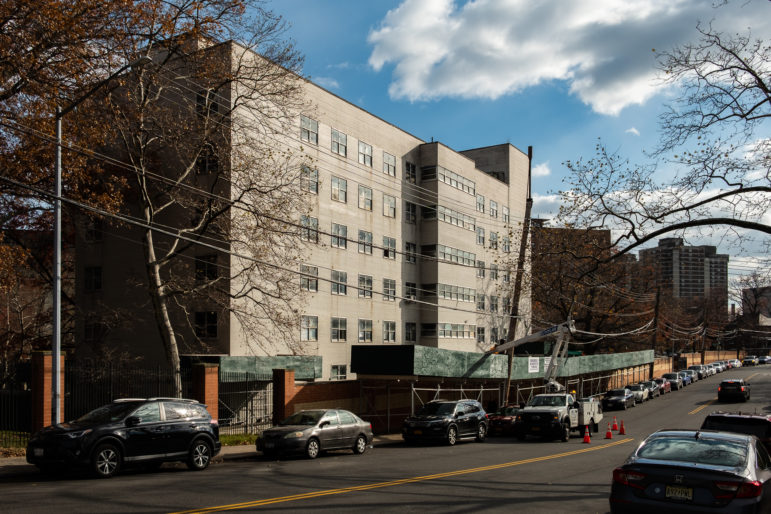
How a Bronx Election Swerved the Course for Plan to House Formerly-Incarcerated
Political calculus around a City Council race in the East Bronx has slowed the approval process for a plan to house seriously ill people leaving jail, and could cue up a test: whether the Council is willing to override opposition from one of their own.
Adi Talwar
View from Seminole Avenue of the proposed Just Home project building on Jacobi Medical Center’s campus.
Political calculus around a City Council race in the East Bronx has slowed the approval process for a plan to house seriously ill people leaving jail, and could cue up a test—whether the Council is willing to override opposition to development from one of their own.
The city’s Health + Hospitals Corporation (HHC) postponed a hearing for the Just Home project, initially set for Monday Nov. 13, hoping to avoid a public showdown with Council Member Marjorie Velázquez in the leadup to the Nov. 7 election and negotiate with her when “cooler heads prevail,” according to a source familiar with City Hall’s thinking.
Velázquez, who lost to Republican Kristy Marmorato, has opposed the plan to turn a Jacobi Medical Center building into several dozen apartments for Correctional Health Services patients who might otherwise stay in city jail infirmaries.
In a statement, Velázquez said that her “unwavering opposition… is a matter of public record,” and that she will keep advocating for alternatives like a women’s health center or senior housing for the site. Yet her last-minute decision to back a residential upzoning on Bruckner Boulevard last year fueled mistrust among critics of both projects.
Marmorato, meanwhile, says fighting Just Home inspired her to run for office. She lives in suburban Indian Village adjacent to the site, where opposition has been fierce, and has called for senior or veteran housing there. “I’m scared of the element of danger you’re welcoming into my community,” she testified before Community Board 11 last fall, according to video of the meeting.
Velázquez did not address the postponed Nov. 13 hearing in her statement. Meanwhile, other stakeholders said the project is moving forward.
“We are going full force ahead,” said JoAnne Page, president and CEO of The Fortune Society, the reentry service provider selected last June to run the building.
An HHC representative also said they remain committed to Just Home and will provide an updated timeline when available, information reiterated by a spokesperson for New York City Housing Preservation and Development. The project is in line with a priority in Mayor Adams’ 2022 Housing Blueprint, to construct apartments on hospital land.
A screenshot of the HHC website, showing the Just Home hearing postponement notice.
The Nov. 13 HHC hearing was delayed because of the election, Page said, citing project meetings with HHC and HPD, which has a role in financing such projects.
“In my mind, we didn’t want Just Home to be any more of an election issue than it needed to be, and that’s just speaking from Fortune’s perspective, because there were some really ugly public hearings,” Page told City Limits.
The delay is welcome because it gives Fortune Society more time to do outreach to City Council members, Page added.
Hearings on Just Home devolved into chaos last year, with attendees referring to future tenants—New Yorkers leaving Rikers Island, a population that is primarily Black and Latino—as “criminals” and “animals.”
Michael Kaess, a district resident and member of the pro-development group Open New York who supports the project, filmed the meetings, becoming a target for expletives and threats.
“We looked terrible,” Marmorato said Friday. “Some of the behavior of people was not okay.” But the project still raises safety concerns, she said, and could bring “violent criminals” to the neighborhood.
Efforts to construct low-income housing and shelters often face backlash, flaring resentments about neighborhood change and fear of crime. In a September FAQ, HHC emphasized that most people detained on Rikers have not been convicted of any crime—a point reiterated in an open letter organized by the Open Hearts Initiative in support of the plan.
Proponents of Just Home also say that the project would meet a dire need for supportive housing—apartments with on-site services—for people who require more medical support than shelters, or the city’s notorious Rikers Island jail, can provide.
According to HHC, Just Home would house Geriatric & Complex Care Service patients, most of whom have a “significant” diagnosis such as cancer, lung disease or diabetes.
“Their medical needs cannot be addressed in a homeless shelter, and they cannot be addressed where they are on Rikers,” said Roxanne Delgado of Friends of Pelham Parkway, who lives about a mile from the site and has spoken out in favor of Just Home. “For them to live in a jail or a homeless shelter, it basically is a death sentence. And I don’t believe in the death sentence at all.”
Delgado, a Democrat, added that she ultimately voted for Marmaroto, calling it a vote in opposition to Velázquez, who she deemed a largely absent and inconsistent politician.
“The current Council member and her opponent both expressed opposition to the [Just Home] project, so it was not a factor for me when I voted,” she said. “If the Council member had supported it publicly perhaps it would have been a factor in support of her, but that was not the case here.”
Just Home would have under 100 apartments, according to Page of Fortune Society. Most would be supportive housing, either for people with completed sentences or awaiting court dates. Others would be subsidized with a preference for district residents.
While Page’s team continues to hammer out the details, Marmorato expressed hope that Just Home will not come before the City Council until she takes office in January, and can begin making her case.
Adi Talwar
A sign in front of a home near Seminole Avenue had signs opposing the Just Home project in December 2022.
“I would hope it waits until once I’m in office,” she said. “At least give me a little time to build relationships and try to rally my colleagues.”
Velázquez echoed the sentiment, saying the district has entered a period of transition and she believes strongly that “taking official actions—especially any vote—on an issue of this weight during the transition is inappropriate.”
This timeline seems likely. HHC public hearings require 20 days’ notice, pushing any rescheduled hearing at least into December. The HHC Board of Directors, which meets once per month, would then have to approve the ground lease. Only then would HHC submit an application to the City Council for consideration.
The project does not require a zoning change, so is not subject to the Uniform Land Use Review Procedure. Instead, it must pass through the Council’s Subcommittee on Landmarks, Public Sitings, and Dispositions, followed by the Land Use Committee and full body.
The Council has traditionally voted in step with the local member when a development project is up for consideration, a practice known as member deference. In a large city with many projects to vote on each year, deference can increase efficiency and assumes a certain level of trust between the body’s 51 members.
But the Council notably strayed from that practice two years ago, voting against then Council Member Ben Kallos to approve a tower on the Upper East Side.
And while Velázquez ultimately backed the Bruckner rezoning in Throggs Neck for 350 new apartments, stating that “member deference is not dead,” City Limits reported that the Council was under considerable pressure—from Mayor Adams, unions, pro-development groups, and the body’s own leadership—to proceed without her support.
If the Adams administration gambled that Velázquez would win, setting the stage for calmer negotiations post-election, the calculus has now changed. Proponents of Just Home say they see an obvious choice for a Council with a Democratic supermajority and a stated mission to increase affordable housing development across the city.
Velázquez’s district produced among the fewest city-financed affordable housing units between 2014 and 2022, according to a report by the New York Housing Conference, ranking 47 out of 51 districts.
Brenden Cheney, director of policy and operations for the group, said he hopes the Council will approve Just Home on its merits, but that Marmorato’s win makes the choice even more obvious. Though the project is contentious, he noted, HHC is not asking to build bigger or taller, like the Bruckner developers were.
“I think it’s less likely that the full Council, which is dedicated to adding housing supply, will listen to NIMBY concerns of a member of the opposite party,” he said.
Brooklyn Democratic Council Member Lincoln Restler, a member of the body’s Progressive Caucus, said Friday that he would buck member deference. “It makes perfect sense to build this type of supportive housing on [HHC] campuses,” he said. “I hope this project comes for a vote and I am committed to supporting it.”
One strong opponent of Just Home, former Democratic District Leader Irene Estrada, ran against Velázquez in the primary election this summer. She said Friday that she would support Just Home tenants “anywhere else just not on our block.”
Estrada congratulated Marmorato on her win, but predicted that stopping the project will require more community-led protests. “A lot of people think this isn’t going to happen because Kristy won,” she said. “It doesn’t work like that. She got elected, yes, but there’s 51 [Council] members who are going to make the decision.”
A representative of the Council did not take an explicit position on Just Home in a statement to City Limits, but said every district must do its part to alleviate the city’s housing crisis and touted the benefits of supportive housing for people leaving jail.
“Supportive housing is vital to providing stability for New Yorkers facing long-term challenges, including those returning from the justice system who need support,” they said. “Stable housing with supportive services is a pillar of successful reentry that increases public safety and facilitates people’s transitions back into their communities.”
“Like with all land use projects, the Council will evaluate the proposals on their merits when they are before us,” the spokesperson added.
To contact the editor behind this story, email jeanmarie@citylimits.org. To contact the reporter, email emma@citylimits.org.
The post How a Bronx Election Swerved the Course for Plan to House Formerly-Incarcerated appeared first on City Limits.


